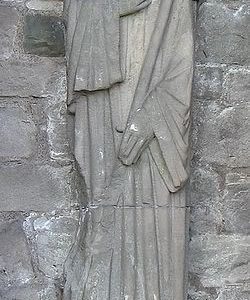In Catholic-Protestant dialogues, one of the most surprising things for Catholics to hear is that the majority of Protestants don’t believe Mary stayed a virgin her entire life. For us, the word “virgin” is practically part of her name. We call her the Virgin Mary just as often as we just call her Mary (if not more often!), so thinking of her as a perpetual virgin is second nature to us.
But not so for Protestants. While it can be tough to generalize about Protestants, it is fair to say that the majority of them don’t accept this dogma. They believe that Mary conceived and gave birth to Jesus as a virgin, but after that, she and Joseph had a normal sexual life. And to prove it, they point to several passages in the Gospels. For example, they like to cite a text from the Gospel of Matthew that seems clear and decisive:
“When Joseph woke from sleep, he did as the angel of the Lord commanded him; he took his wife, but knew her not until she had borne a son; and he called his name Jesus.” (Matthew 1:24-25)
This passage comes right after Joseph finds out that Mary is pregnant. At first, he is going to divorce her quietly, but then the angel Gabriel comes to him in a dream and tells him, “[D]o not fear to take Mary your wife, for that which is conceived in her is of the Holy Spirit” (Matthew 1:20). So he changes his mind when he wakes up, and as the text tells us, he “did as the angel of the Lord commanded him.”
After that, we get to the interesting part: Joseph “knew her not until she had borne a son.” The phrase “knew her” is the famous biblical idiom for sex, so it means that Joseph didn’t have sex with Mary until Jesus was born. And here comes the kicker: that little word “until” implies that they did in fact have normal sexual relations afterwards. Like I said, that seems pretty clear and decisive, so what should we make of it? Does this really disprove our belief that Mary remained a virgin her entire life?
The Original Greek
No, and here is why. The problem is that we’re reading this passage in English, not Greek. See, in English, the word “until” normally implies a change after the event in question. For instance, if I say, “I am going to stand up until he gets here,” that implies that I will sit down once the person arrives. Similarly, when the Gospel of Matthew says that Joseph did not have sex with Mary until Jesus was born, that implies that they did have sex afterwards.
But ancient Greek is different. In Greek, the word “until” does not have that same implication. It simply refers to what happened before the event in question, but it does not imply anything about what happened afterwards. To see what I mean, let’s look at a few examples, starting with arguably the clearest case in the entire Bible:
“And Michal daughter of Saul had no children to the day of her death.” (2 Samuel 6:23)
The Old Testament was written in Hebrew, but the ancient Greek translation of it, called the Septuagint, uses the same word for “to” that Matthew 1:25 uses for “until.” Now, it is obvious that Michal didn’t have children after she died. This verse simply means that she didn’t have any children before she died, and it does not imply anything about what happened afterwards. Next, let’s consider a text from the New Testament:
“Until I come, devote yourself to the public reading of Scripture, to preaching and to teaching.” (1 Timothy 4:13)
In this verse, St. Paul is giving Timothy, the bishop of Ephesus, instructions for what to do “until” he arrives, but he obviously doesn’t want Timothy to stop doing those things once he gets there. As bishop, it would still be his responsibility to preach and to teach his congregation, so once again, we see that the Greek word “until” doesn’t imply anything about what would happen after the event in question.
Heos Hou
Before we move on, there is one common counterargument to all this that we need to address. Technically, Matthew 1:25 doesn’t use the exact same term as those other verses we looked at. In both 2 Samuel 6:23 and 1 Timothy 4:13, the Greek word is heos, but Matthew uses a slightly longer version, heos hou.
Now, Protestants sometimes contend that the extra word hou gives Matthew’s words about Joseph and Mary a different meaning. They sometimes argue that this fuller phrase does in fact imply that Joseph and Mary had normal sexual relations after Jesus was born, but there is one big problem with that argument: it is simply not true. No major ancient Greek lexicon or grammar book that I am aware of says that hou changes the meaning of heos. At best, these texts mention that the word hou may be used with heos, but they give no indication that it changes the meaning of the term.1
An Inconclusive Argument
With all that background in mind, let’s turn back to the verse in question, Matthew 1:25. It says that Mary and Joseph did not have sex “until” Jesus was born, and in English, that implies that they did have sex afterwards. But as we saw, that is not the case in ancient Greek. Instead, the Greek word “until” simply tells us that Mary and Joseph remained celibate before Jesus was born, but it does not imply anything about what happened afterwards.
And once we realize that, we can see that this Protestant argument is a bust. Matthew 1:25 doesn’t disprove the dogma of Mary’s perpetual virginity, so to determine if it is biblically sound, we have to look at other, more conclusive considerations.
✠
Endnotes 1) For example, BDF §216.3, 383 and Smyth §2383












